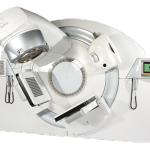First-line treatment with Imfinzi (durvalumab) combined with standard chemotherapy significantly prolongs the life of people with extensive-stage small cell lung cancer (SCLC), final results of the CASPIAN Phase 3 trial show. Approval of the combination for this type of aggressive lung cancer is under review by regulatory authorities in the U.S., E.U., and Japan. In…
Category: Cancer
As a Member of the Cancer Club, Coronavirus Is Not Fun
Finding the energy to write about the experience of being an immunocompromised person at the time of the coronavirus pandemic is a struggle. I’m exhausted, even though I’ve been confined to the perimeters of a 6-foot-wide, 8-foot-long couch for the entirety of the day. Well, for the week actually. But I’ve been working full days…
Better Responses with IO102-Keytruda Combo Likely in Ongoing NSCLC Trial
Adding IO Biotech’s lead candidate, IO102, to first-line treatment with Keytruda (pembrolizumab) is likely to result in better response rates in people with metastatic non-small cell lung cancer (NSCLC), an interim analysis of a Phase 2 trial showed. The analysis, with predetermined requirements and called a futility analysis, determines whether a trial will likely meet its goals,…
Komen Suggests Delaying Routine Mammograms During COVID-19 Outbreak
To help minimize the threat of COVID-19 to themselves and others, healthy women at average risk should postpone breast cancer screening until later this year, Susan G. Komen recommends. However, the nonprofit organization emphasized that those experiencing breast cancer warning signs should alert their healthcare providers to assess the need for diagnostic imaging. Komen’s recommendation…
Combining Two Biopsy Methods Improves PC Diagnosis, Study Shows
Combining two methods of prostate biopsy — using one guided by magnetic resonance imaging (MRI) along with conventional ultrasound-guided biopsy — results in a more accurate detection of clinically significant prostate cancers than either method alone, a study shows. The researchers hope this combined method will improve clinicians’ current confidence levels in prostate cancer diagnosis…
Cellular Recycling Genes Linked to Ovarian Tumor Formation in Mice, Study Shows
Disrupting genes essential for the cellular recycling process known as autophagy increases the frequency of mutations during cell division and promotes the formation of ovarian cancer tumors, a study in mice has found. These findings support further investigation into the process of autophagy, which is often abnormal in ovarian cancer patients, as a potential target…
Genetic Test May Help Identify Ultra High-risk Multiple Myeloma
A novel genetic test could help identify people with multiple myeloma who are at highest risk of aggressive disease and unlikely to respond to standard treatment with Revlimid (lenalidomide), a new study shows. The study, “Predicting ultrahigh risk multiple myeloma by molecular profiling: an analysis of newly diagnosed transplant eligible myeloma XI trial patients,” was…
MD Anderson Cancer Center to Acquire Latest in Elekta Radiotherapy Systems
The University of Texas MD Anderson Cancer Center has signed a contract with Elekta to acquire Elekta Infinity linear accelerators and brachytherapy afterloaders, as well as software and services. Elekta, which specializes in tools and systems to treat cancer and brain disorders, claims that its innovations are behind most of the critical technological advances in radiation oncology over the…
Harbour BioMed Gets FDA Nod to Start US Trials of 2 Immunotherapies
The U.S. Food and Drug Administration (FDA) has approved Harbour BioMed’s investigational new drug applications to initiate U.S. clinical trials testing two of its immunotherapy candidates — HBM9167 and HBM4003 — in several cancers. HBM9167 and HBM4003 are immune checkpoint inhibitors designed to boost the body’s anti-tumor responses by blocking the proteins that cancer cells use to…
Herzuma, Biosimilar to Herceptin, Available in US for HER2-positive Breast Cancers
Herzuma, a biosimilar to Genentech‘s Herceptin (trastuzumab), is now available in the U.S. for the same indications as the reference therapy, including for the treatment of HER2-positive breast cancers and stomach cancers. The treatment was approved by the U.S. Food and Drug Administration (FDA) in December 2018, the same year it was approved by the European Medicines Agency.…











